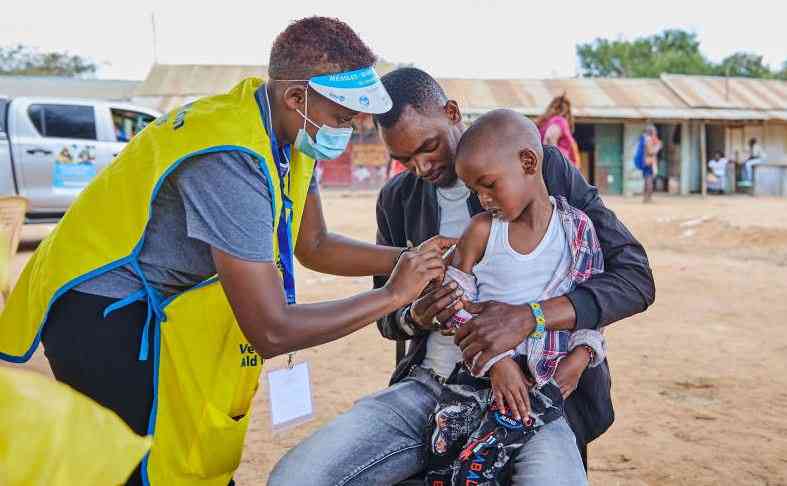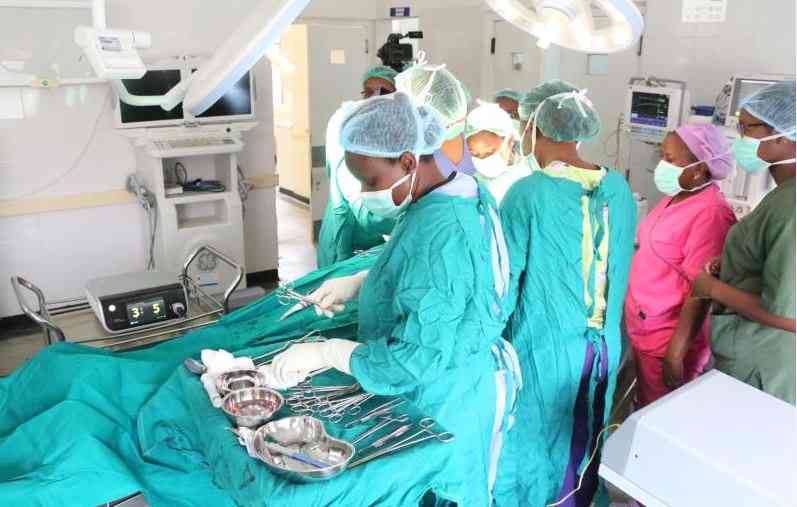
When 29-year-old Joan Amimo got a new job in Nanyuki, she had to relocate from Nairobi. After some time in her new workplace, Amimo started experiencing extreme fatigue, memory lapses and brain fog.
“I had extreme mood swings and was avoiding people since I was getting irritated quite often. I would also struggle to wake up and go to work and would call in to report late on several occasions.”
Amimo had also started feeling colder than usual, and her menses suddenly started becoming heavier than usual.
At first, she dismissed the symptoms, thinking it could be due to a change of environment. However, when she went for the first annual check-up sponsored by her workplace in 2019, the doctors found she had hypothyroidism, a condition in which the thyroid gland is underactive and produces less thyroid hormone than is needed.
Dr Rosslyn Ngugi, an endocrinologist, explains that the thyroid is a small butterfly-shaped gland located at the front base of the neck. It consists of two lobes that are connected by a thin tissue, known as the isthmus, and are comprised of cells called ‘thyroid follicles’.
“The primary function of the thyroid is the synthesis and release of two main thyroid hormones — triiodothyronine (T3) and the relatively inactive prohormone tetraiodothyronine (T4), which is more commonly known as thyroxine,” she explains.
Your thyroid’s main job is to control the speed of your metabolism (metabolic rate). This is the process of how your body transforms the food you consume into energy. All the cells in your body need energy to function. When your thyroid isn’t working properly, it can impact your entire body.
“A blood test measuring your hormone levels is the only accurate way to find out whether there’s a problem. The test, called a thyroid function test, looks at levels of thyroid-stimulating hormone (TSH) and thyroxine (T4) in the blood. A high level of TSH and a low level of T4 in the blood could mean you have an underactive thyroid,” Dr Ngugi explains.
- Pregnancy: Embracing the awkward moments with grace
- Premature menopause: Why some women experience it in their 20s
- Thyroid disorders: What they are and how they affect body, treatments
- Blood spots on baby girl's diapers? False menses it is
Keep Reading
Normal TSH levels in adults typically range from 0.4 to 4.0 milli-international units per liter (mIU/L). Levels outside this range can indicate thyroid dysfunction, with high TSH potentially suggesting hypothyroidism (underactive thyroid) and low TSH indicating hyperthyroidism (overactive thyroid).
“Normal T4 levels, measured as Free T4, typically fall within the range of 0.8 to 1.8 nanograms per deciliter (ng/dL) for adults. Total T4 levels, which include both free and protein-bound T4, are usually between 5 and 12 micrograms per deciliter (mcg/dL). These ranges can vary slightly depending on the laboratory and the individual’s age and sex,” explains Dr Ngugi.
For Amimo, her TSH levels were at 10 mIU/L while her T4 levels were very low, meaning she had overt hypothyroidism. This level signifies that the thyroid gland is not producing enough thyroid hormone, leading to an underactive thyroid condition. She struggled with the disease as accessing the right treatment was difficult for her.
“There was no endocrinologist in Nanyuki, so I would go back and forth from Nairobi to Nanyuki, and this means I would be on and off medication.”
With the right support, Amimo started taking medication consistently as early as 6 am. She also changed her diet and is now managing the condition well, thanks to acceptance and the right support.
She is now part of a Thyroid Support group where they share their experiences and encourage one another through their diagnoses. Her advice to caregivers of people with thyroid disease is, “Have a listening ear to a thyroid patient and know that everyone is experiencing it differently.”
She also hopes that the government and relevant authorities would create more public awareness of the disease and make diagnosis and treatment affordable.
“I am blessed to have my employer, who has given me a good medical cover, but for someone who does not have an insurance cover, it is very costly. Sometimes we have to share medication within our support group because some people cannot afford the drugs,” she adds.
According to Amimo, tests, medication and consultation for thyroid disease would cost about Sh100,000, an amount which would be difficult for someone without insurance to raise.
In September 2020, 31-year-old Sarah Philip started feeling hungry often, typically every 30 minutes after eating a whole meal. She was also feeling too much heat on her body, “ I would feel like I was literally burning,” she narrates. Sarah adds that she would “start craving and eating certain foods that I never used to like before, and even with all that increase in appetite, I was losing weight instead of gaining.”
Sarah narrates how she had heart palpitations and seizures that would see her in and out of the hospital, where she was first misdiagnosed with amoeba.
When the palpitations and tremors could not stop, she went for another check-up, and after carrying out several inconclusive tests, Sarah was referred to a public hospital for a thyroid test. When the results came out, her doctor was openly shocked by the results. A reaction she feels was unprofessional.
“I was so distressed, wondering what disease this was that would make a doctor scream in shock like that. She even said that since she started practising, she had never seen such high levels of toxicity in a thyroid patient.”
Sarah later learnt after seeing a specialist that she was also given the wrong prescription from the same doctor. To add insult to injury, Sarah’s friend had passed on from thyroid disease a few months before her diagnosis. The fear of death engulfed her.
“I lost a lot of friends who did not understand what I was going through. “I was depressed and would only think of death. I would walk around our compound to look for a place where I would be buried, she narrates.”
Sarah was, however, lucky to have had the emotional and financial support from her family, without which she would not have afforded the treatment, since she did not have a well-paying job at the time of her diagnosis. She has since accepted her condition and is now on daily medications.
“It is the worst thing because I don’t like taking medications. Sometimes I skip them because they have negative side effects, like my kidneys and liver have been affected. I take organic products and traditional herbs to help my liver. I hope that one day I will go for the tests and stop the drugs, even though doctors say it may be a lifetime disease.”
Her advice to anyone struggling with hyperthyroidism: “If you have been diagnosed with thyroid disease, stay strong. Accept it because denial leads to a lack of you taking care of your body since it takes a toll on your hormones and mental health. Seek a second opinion and join a support group. You will conquer this demon.”
According to Dr Ngugi, hyperthyroidism, also known as an overactive thyroid, is a condition where the thyroid gland produces too much thyroid hormone, leading to a sped-up metabolism. This can cause various symptoms and potentially serious complications if left untreated. Hyperthyroidism during pregnancy can lead to both maternal and fetal complications. Uncontrolled hyperthyroidism can increase the risk of miscarriage, premature birth and low birth weight.
Such is the case of Caroline*, who has had two miscarriages due to the disease. When she started conceiving, she would go to the nearby local dispensary for antenatal checkups. But the nurses never recommended thyroid tests. “It was a harrowing journey. All along I thought I was cursed or something. I wish I had known about it earlier to prevent the miscarriages.”
It his during her third pregnancy that Caroline decided to see a specialist who carried out several tests and found that she had Graves’ disease. She has since been on medication and was finally able to deliver a healthy baby in 2024. “Mothers may experience preeclampsia and heart failure, and in rare cases, thyroid storm, a severe and potentially life-threatening condition. Fetal complications include stillbirth and neonatal hyperthyroidism,” explains Dr Ngugi.
Due to a lack of awareness and specialists in Kenya, patients are often diagnosed late, usually when seeking care for other health issues, according to a 2022 study at Kenyatta National Hospital that found a 36.8 per cent prevalence of thyroid disorders among heart failure patients. We have also seen several unqualified mushrooming clinics offering thyroid tests, but I would advise you against them, since many of them are just out to make money,” says Dr Eric Njenga, a consultant endocrinologist.
In a bid to curb this, global pharmaceutical firm, Merck, launched ThyroAfrica, an initiative that aims to improve early detection, diagnosis, and treatment of conditions such as hypothyroidism. The campaign was unveiled in Nairobi just ahead of World Thyroid Day on May 25.
ThyroAfrica is structured around three core pillars: Patient Awareness, Healthcare Provider (HCP) Diagnosis Excellence, and Partnership. The campaign leverages social media outreach and community engagement to educate the public, while equipping medical professionals with diagnostic tools such as webinars, case studies, and a free T-Lab mobile app for accurate dosage management,” said Joshua Mugweru, Merck’s Head for Sub-Saharan Africa, during the launch.
Merck Kenya General Manager John Ndeti emphasized the widespread nature of thyroid disorders.
“Hypothyroidism affects over 200 million people globally, yet only about 20 percent receive treatment due to underdiagnosis,” he said.
According to Ndeti, the ThyroAfrica campaign seeks to make thyroid health a public health priority, promoting early intervention and long-term policy inclusion for thyroid-related non-communicable diseases.
 The Standard Group Plc is a multi-media organization with investments in media platforms spanning newspaper print
operations, television, radio broadcasting, digital and online services. The Standard Group is recognized as a
leading multi-media house in Kenya with a key influence in matters of national and international interest.
The Standard Group Plc is a multi-media organization with investments in media platforms spanning newspaper print
operations, television, radio broadcasting, digital and online services. The Standard Group is recognized as a
leading multi-media house in Kenya with a key influence in matters of national and international interest.











